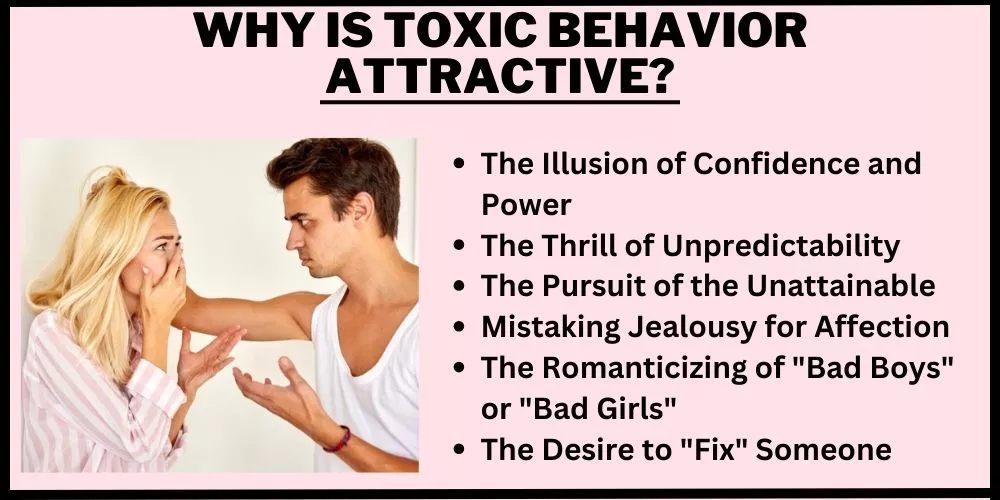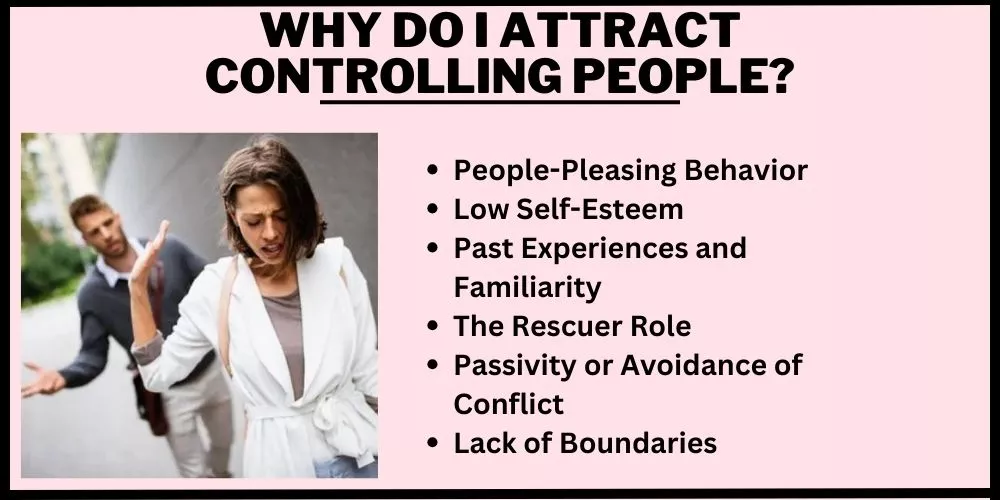Attraction can be a complex, multi-faceted enigma, especially when it appears to defy logic.
Perhaps one of the most perplexing dynamics is why do girls like toxic guys.
This attraction often leads to relationships riddled with drama, pain, and chaos. What lures these women into the spiral of emotional turmoil?
Is it purely emotional vulnerability, or does it reach into the deeper echelons of psychology?

In this article, we delve into the possible explanations behind this common and concerning pattern, unravelling the whys of this seemingly counterintuitive attraction.
Why do girls like toxic guys?
The reasons why some women may find themselves attracted to toxic men are plentiful and complex.
Here are a few potential explanations:
1. The Pursuit of ‘The Bad Boy’
At the heart of several toxic relationships, you’ll often find the ‘bad boy’ archetype. These individuals frequently exhibit traits such as indifference, rebellion, unpredictability, and emotional unavailability.
Society often portrays these characters as exciting and adventurous, leading some women to become fascinated by the allure of the “dangerous” character, despite their potential to cause emotional harm.
2. Low Self-Esteem
Individuals with low self-esteem may consciously or subconsciously seek out relationships that affirm their self-perception.
If a woman believes that she is undeserving of love, respect, or care, she may find herself in a relationship with a toxic individual who validates these insecurities.
3. The Cycle of Abuse and Trauma
Experiences from one’s formative years can greatly influence future relationship choices.
For instance, if a woman grew up witnessing toxic relationships, she might unconsciously seek out similar patterns in her own relationships, mistaking toxicity for familiarity and comfort.
4. The Desire to “Fix” or “Change” a Partner
Some individuals are drawn to the prospect of “healing” or “changing” their partners. They believe that they can inspire the toxic individual to change their ways. This savior complex can lead them into emotionally draining or abusive situations.
5. Misunderstanding Love and Affection
Sometimes, women mistake toxic behaviors such as possessiveness and jealousy for love and affection. They may think that these are signs of their partner’s deep love and passionate feelings.
Do girls like toxic guys or nice guys?
The age-old debate of whether women prefer “toxic guys” or “nice guys” often leads to generalizations and stereotypes.
It’s important to recognize that women, like all people, have diverse preferences and tastes that can’t be placed into a simple binary.

Nevertheless, there are some common themes that can be considered when attempting to understand the wide range of relationship dynamics. Let’s delve into these themes:
1. The Appeal of Confidence
One argument in favor of women being attracted to “toxic guys” is that these individuals often display outward confidence – even if it is misplaced or exaggerated. Confidence can be appealing, and individuals may misinterpret arrogance or indifference as genuine self-assurance.
On the other hand, “nice guys” may sometimes appear less assertive or less certain of themselves, which can lead to them being overlooked.
2. Emotional Maturity and Growth
As people mature and gain life experiences, their preferences and attractions may change. Younger individuals may be drawn to the excitement and unpredictability that the so-called “toxic guys” provide.
However, as women grow older and more emotionally mature, they may start valuing stability, kindness, and mutual support over the drama that toxic relationships can offer, seeking out “nice guys” who can provide these qualities.
3. Availability and Approachability
“Nice guys” may not always proactively pursue romantic interests or make their intentions clear. As a result, some women might find themselves being pursued by the more forward “toxic guys,” who tend to be more persistent and assertive in their approach.
4. Individual Tastes and Preferences
Each woman has her individual preferences when it comes to romantic partners. Some may prioritize specific qualities like intelligence, humor, ambition, or kindness that can be present in both “nice guys” and “toxic guys.” Ultimately, what one person may find attractive, another may not.
5. The Fluidity of Relationship Dynamics
Labels such as “toxic guys” and “nice guys” don’t capture the full complexity of an individual’s personality. A person might exhibit toxic behaviors in one relationship but learn and grow to become more considerate and empathetic in another.
Similarly, a “nice guy” could reveal troubling behaviors when faced with different life challenges or circumstances.
Why do I get attracted to toxic guys?
If you find yourself consistently being drawn to toxic men, it’s crucial first to acknowledge your pattern. This isn’t about blame, but about understanding, growth, and ultimately, change. Here are some potential reasons to consider:

1. Familiarity
Many individuals grow up in environments where toxicity was part of their family or relationship dynamics. This familiarity may translate into comfort and normalcy in adult relationships, and thus subconsciously, toxic relationships can feel like ‘home’, even if they are harmful.
2. Low Self-esteem
Low self-worth can sometimes lead people to form relationships with partners who reinforce these negative self-beliefs. If you associate love with pain, neglect, or abuse due to past experiences, you might consciously or subconsciously seek out partners who perpetuate these patterns.
3. The Fixer-Upper Appeal
The idea of being the one to inspire a profound change or ‘heal’ a troubled man can be appealing. This ‘project’ can provide a sense of purpose or divert attention from personal growth that we might need to undertake ourselves.
4. Excitement and Drama
Alarming as it may sound, some individuals are drawn to the unpredictability and intense emotions that often characterize toxic relationships. These relationships are seldom dull, which can provide a form of excitement, albeit a harmful one.
5. Misconstruing Control for Care
Sometimes, controlling behaviors such as jealousy or constant check-ins can be mistaken for care, love, and attentiveness.
However, it’s essential to note that these explanations don’t serve as justification for the actions of toxic individuals. Abuse, manipulation, and emotional games are never acceptable.
Why is toxic behavior attractive?
Toxic behavior is not inherently attractive, but certain aspects or manifestations of it can create a perception of allure due to various psychological factors and social conditioning. Here are few elements that may contribute to the appeal of toxic behavior:

1. The Illusion of Confidence and Power
Toxic behaviors such as arrogance and manipulation are often mistaken for strength, assertiveness, and self-assuredness. Society has long equated confidence and power with attractiveness. Hence, these outward displays may initially appear intriguing.
2. The Thrill of Unpredictability
Unpredictable behavior is a common trait among people who exhibit toxic behavior. This unpredictability might keep people on their toes and create a sense of excitement, danger, or challenge.
Such intense emotions can be mistaken for passion in the early stages of relationships, leading to an amplified attraction.
3. The Pursuit of the Unattainable
Toxic individuals frequently exhibit emotional unavailability. The pursuit of an emotionally inaccessible person can become an obsession, leading to a cycle where the constant validation seeking becomes an addictive pattern.
4. Mistaking Jealousy for Affection
Toxic individuals often express intense jealousy or possessiveness, and some mistakenly perceive this as a reflection of deep affection or love. While these behaviors may seem flattering in the initial stages, they can quickly escalate into coercive control or abuse.
5. The Romanticizing of “Bad Boys” or “Bad Girls”
Popular culture and media often romanticize toxic behavior, associating it with the ‘bad’ character that’s exciting, passionate, and rebellious. This portrayal can help warp perceptions, leading people to misconstrue toxicity as attraction.
6. The Desire to “Fix” Someone
There can be a strange allure in trying to be the person who brings about a change in the toxic individual’s behavior. This notion, often fed by the common trope in media of ‘healing through love,’ can make toxic individuals seem more attractive.
How do I stop liking a toxic guy?
Breaking free from an attraction to a toxic individual can be a challenging but vital step toward emotional well-being. It requires self-awareness, commitment, and patience. Here are some steps you can take to stop liking a toxic guy:

1. Acknowledge the Issue
Accept that you are drawn to someone who is not good for you emotionally or mentally. By recognizing this, you can begin the process of distancing yourself from them and breaking the cycle.
2. Set Boundaries
Establish clear boundaries and limit your interaction with this person. Stay away from situations that may lead to further connection, such as social events, online platforms, or common friend groups.
3. Assess Your Needs
Reflect on what attracts you to this individual and identify what emotional needs are being met through your attraction. This could include validation, excitement, or even the desire to “fix” someone.
4. Focus on Self-Improvement
Redirect your emotional energy toward personal growth. Invest time in building self-esteem, practicing self-care, and cultivating positive habits that contribute to your emotional and mental well-being.
5. Seek Support
Share your feelings with friends, family, or a licensed therapist. They can offer guidance, understanding, and encouragement as you work through your attraction and help you stay accountable in your journey.
6. Understand Healthy Relationships
Educate yourself on the characteristics of healthy, empowering relationships. Learn to recognize the red flags of toxic behavior so you can be better prepared to avoid them in the future.
7. Develop New Interests
Engage in new hobbies, interests, or social activities that help you build connections and achieve personal fulfillment outside your attachment to the toxic individual.
8. Emphasize Self-Compassion
Give yourself the grace to acknowledge that it’s okay to feel attracted to someone who isn’t good for you. You are allowed to make mistakes and learn from them. Forgive yourself, but also commit to avoidance and growth.
9. Patience and Persistence
Moving on and overcoming an attraction to a toxic person takes time and persistence. There may be moments of vulnerability, but don’t let this deter you. Stay focused on your emotional well-being and growth.
Why do I attract emotionally unstable guys?
If you often find yourself attracting emotionally unstable individuals, it can be an unsettling pattern to deal with.

It’s important to remember this is not a reflection of who you are as a person; however, it may signify certain aspects of your behavior or outlook that you could be unknowingly projecting. Here are a few potential factors to consider:
1. Empathy and Understanding
Some people with high levels of empathy and understanding tend to attract those who are emotionally unstable. They might see you as a safe haven, a person who offers understanding and support.
While empathy is an essential quality, it’s important to remember that it’s not your responsibility to heal or fix someone else at your own expense.
2. Low Self-Esteem
If you struggle with low self-esteem, you may unknowingly attract emotionally unstable individuals. This could be because they sense a vulnerability that allows them to be less guarded, or it could be because they perceive an opportunity to gain control or influence.
3. Lack of Boundaries
Being overly accommodating or lacking personal boundaries might attract emotionally unstable partners who might exploit this for their own emotional needs.
It’s essential to establish and maintain healthy boundaries to protect your emotional health and wellbeing.
4. The ‘Rescuer’ Tendency
If you tend to fall into the ‘rescuer’ role in relationships, you may attract individuals who seek someone to help ‘save’ them from their emotional issues. It’s important to realize that lasting positive change can only come from the individuals themselves.
5. Co-dependency
Co-dependent relationships may emerge when you seek validation by caring for others, which can attract emotionally unstable individuals who desire nurturing.
6. Familiarity
If you have grown up around emotional instability, you may subconsciously seek out similar patterns in your romantic relationships.
Why do I attract controlling people?
Attracting controlling individuals can be a distressing pattern to experience in relationships. There may be an array of underlying reasons that could contribute to this issue.

By understanding these factors, you can take steps towards fostering healthier relationships. Here are some possible aspects to consider:
1. People-Pleasing Behavior
Being overly accommodating or engaging in consistent people-pleasing habits can make you susceptible to attracting controlling individuals who might take advantage of your eagerness to please.
They may interpret your kindness as a sign of submissiveness and believe they can easily influence you.
2. Low Self-Esteem
Low self-esteem might lead you to accept the controlling behavior of others, because deep down, you may feel undeserving of genuine respect, love, or autonomy within your relationships.
Controlling individuals might be drawn to this vulnerability, hoping to use it for their own gain.
3. Past Experiences and Familiarity
If you had a family member or caregiver with controlling tendencies during your upbringing, you might subconsciously be drawn to similar dynamics in your adult relationships.
4. The Rescuer Role
Playing the rescuer in relationships might attract controlling people who are looking for someone to depend on or to assert authority over, while they maintain the role of the ‘victim’.
5. Passivity or Avoidance of Conflict
If you are inherently passive or avoidant of conflicts, you may be more willing to accept controlling behaviors from others as a means to maintain peace.
Controlling individuals are likely to pick up on this, drawing them toward relationships where they can dictate terms with minimal resistance.
6. Lack of Boundaries
Failing to establish or communicate personal boundaries within relationships can attract controlling individuals who might exploit this absence to exert influence or manipulation, leading to an imbalanced power dynamic.
To change these patterns, consider taking the following steps:
- Develop your self-esteem and self-worth through personal growth, self-reflection, and self-compassion.
- Establish and enforce personal boundaries that protect your needs, desires, and values.
- Strive for balance in relationships, ensuring that your ideas and opinions are valued and respected.
- Learn about the signs of a controlling person, so that you can recognize such behavior early on and respond appropriately.
- Consider working with a mental health professional, such as a therapist or counselor, who can help you understand and address the pattern of attracting controlling individuals.
- Reach out to friends or family for support and validation during your journey towards healthier relationships.
Remember that change takes time, so be patient with yourself as you work towards attracting healthier, more balanced relationships in your life.
Why do girls like mean guys?
It’s a common stereotype to suggest that “girls like mean guys” or “bad boys,” but it’s important to note that this isn’t universally true for all girls or women. Everyone is unique and has their individual preferences when it comes to attraction.

However, if someone is consistently drawn to mean or bad boy archetypes, it could be due to a number of potential psychological and social factors:
1. Perception of Confidence
Mean guys or “bad boys” often display high levels of confidence, even if it’s misguided or false. This can be mistaken for strength, charisma, or assertiveness, which could be attractive to some people.
2. Element of Excitement
There often lies a perceived thrill or excitement with mean guys. The unpredictability and rebelliousness they often exhibit can sometimes create a sense of excitement or fascination.
3. Desire to “Fix” or Change the Person
Someone might be drawn to a mean guy with a subconscious desire to “fix” or “heal” them. This could stem from a need to be needed, or the perceived gratification that could arise from transforming a ‘fictionalized’ bad boy into a ‘better’ person.
4. Association with Dominance or Protection
Some sociocultural theories suggest that there may be a perceived association between aggression or meanness and dominance or ability to protect. This perception could potentially stir an attraction.
5. Media and Cultural Influence
Movies, books, and other forms of media often glamorize the bad boy character, reinforcing the idea that they are more appealing or desired, even when they exhibit mean or disrespectful behavior.
6. Mistaken Jealousy for Affection
The intensity in possessiveness or jealousy exhibited by mean guys can sometimes be confused with depth of affection or love.
Why do girls like bad boys?
The idea that “girls like bad boys” is a pervasive stereotype and doesn’t hold true for every woman. Individual preferences differ significantly from person to person.

However, some people are attracted to the “bad boy” archetype due to several psychological and societal factors. Here’s why:
1. Confidence
“Bad boys” often exude a strong sense of self-confidence, which can be attractive. Confidence in moderation is healthy, but it can become problematic when it crosses the line into arrogance or disrespect.
2. Excitement and Novelty
“Bad boys” can bring a certain level of unpredictability and excitement to a relationship. The unpredictability and risk often associated with “bad boys” can provide a sense of adventure or thrill.
3. The Desire to Change a Person
Some girls might be attracted to the idea of changing or “reforming” the “bad boy”. This ‘project’ gives a sense of purpose in the relationship, feeding into a narrative of being the one to uncover their ‘hidden heart of gold’.
4. Perceived Strength and Protection
In some cases, the image of the “bad boy” is associated with strength and assertiveness, traits that can indicate the ability to provide protection.
5. The Rebel Image
Rebellion can be seen as alluring, as it often symbolizes someone who refuses to conform to societal expectations or norms. This can be perceived as independence and confidence.
6. Media Influence
Movies, books, and pop culture often glamorize the “bad boy,” which can influence what individuals find attractive. The enigmatic, thrilling, ‘cool’ image of the “bad boy” pervades our media, potentially impacting our preferences.
7. The “Bad Boy” is a Challenge
Some might be attracted to the “bad boy” because they present a challenge. The struggle and complexity often associated with this archetype can, paradoxically, be intriguing and captivating.
Conclusion :
In conclusion, while not all girls are attracted to toxic guys, those who are may be influenced by factors such as misinterpretation of confidence, media influence, the thrill of unpredictability, or a desire to change the individual.
However, these attractions can lead to unhealthy relationship dynamics. Recognizing these patterns is crucial for making healthier relationship choices.
If someone finds themselves repeatedly attracted to toxic individuals, they may benefit from professional help or counseling to delve deeper into their relationship patterns and work toward a healthier emotional future.
